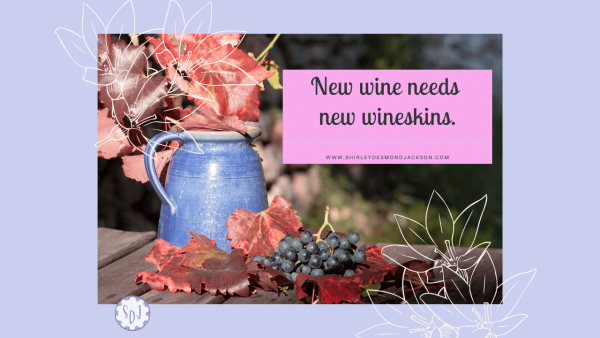
Subscribe to receive a FREE Bible Study!
Share this page

New Wine, New Wineskins
January 16, 2020
Our dilemma is that we hate change and love it at the same time; what we really want is for things to remain the same but get better. –Sydney J. Harris
Sighing, I bit back a heated response. Glancing around the room, I saw my own frustration mirrored in the faces of my colleagues. Our school district had just initiated a new mandate, requiring extensive changes to our schedules and teaching practices. None of us welcomed this new directive.
In stark contrast, after attending a certain teaching conference, I remember myself, as well as many of my peers, feeling invigorated, excited to implement changes in our teaching.
Change. This simple six-letter word invokes a myriad of emotions. Why do we sometimes embrace change, and at other times resist it?
I used to believe it depended on who initiated the change. When self-propelled, change is desired and welcomed. But over time I realize this is not always a hard-and-fast rule.
Jesus taught about change, and our reactions to it, with the following parable:
37And no one pours new wine into old wineskins. Otherwise, the new wine will burst the skins; the wine will run out and the wineskins will be ruined. 38 No, new wine must be poured into new wineskins. 39 And no one after drinking old wine wants the new, for they say, ‘The old is better.’” (Luke 5:37-39 NIV)
Jesus used a familiar practice to teach about change. In His culture, goat skins served as bottles. New skins could expand with the wine as it fermented. But old ones became hard and inflexible. New wine caused them to burst, ruining both the skins and the wine.
Jesus taught this parable after the Pharisees and teachers of the law questioned why He and His disciples did not follow certain rituals (specifically fasting).
In explaining the parable, most Bible commentaries agree the new wine represents the covenant of grace taught by Jesus. In contrast, the old wine refers to the teaching of the religious leaders which exacted strict adherence to the law, rituals and traditions.
However, verse 37 seems to contradict this thinking when it describes the old wine as “better”. How can the old teaching of the Pharisees be described as better?
To understand this verse, we need to look deeper. The word translated as “better” can also be translated as “good” or even “good enough”.
Truthfully, change is hard. Old thought and behavior patterns establish powerful strongholds in our characters. How many times have I eagerly set myself on a path toward change, only to abandon it a few weeks later? As noted in last week’s blog, this happens to 80% of our new year resolutions.
In such cases, we resign ourselves to accept the old ways as “good enough”.
In this verse, Jesus didn’t express preference for the old teaching; He simply exposed how old habits can powerfully hinder our efforts to change.
I realize I can sometimes be like the Pharisees. Trapped in my old ways of thinking, I can be too rigid to try something different. Other times I respond like the disciples, open-minded and able to adopt new ideas or behaviors. I can respond either way, regardless of who initiated the change. Maybe my reaction depends on how well I understand the need to try something new.
Being new doesn’t always mean better. But when we seek to improve a situation in our lives, we must be willing to try something new. We can’t expect to accomplish lasting change by continuing to do what we have always done. As the saying goes, “Insanity is doing the same thing over and over again, but expecting different results.” To embrace the new, we must relinquish the old.
New wine needs new wineskins.
As my journey continues, opportunities to improve will pop up in my path. I pray to stay open to letting go of the old, so I can adopt the new. Wherever you are in your journey, I pray the same for you.
New Wine, New Wineskins
January 16, 2020

Our dilemma is that we hate change and love it at the same time; what we really want is for things to remain the same but get better. –Sydney J. Harris
Sighing, I bit back a heated response. Glancing around the room, I saw my own frustration mirrored in the faces of my colleagues. Our school district had just initiated a new mandate, requiring extensive changes to our schedules and teaching practices. None of us welcomed this new directive.
In stark contrast, after attending a certain teaching conference, I remember myself, as well as many of my peers, feeling invigorated, excited to implement changes in our teaching.
Change. This simple six-letter word invokes a myriad of emotions. Why do we sometimes embrace change, and at other times resist it?
I used to believe it depended on who initiated the change. When self-propelled, change is desired and welcomed. But over time I realize this is not always a hard-and-fast rule.
Jesus taught about change, and our reactions to it, with the following parable:
37And no one pours new wine into old wineskins. Otherwise, the new wine will burst the skins; the wine will run out and the wineskins will be ruined. 38 No, new wine must be poured into new wineskins. 39 And no one after drinking old wine wants the new, for they say, ‘The old is better.’” (Luke 5:37-39 NIV)
Jesus used a familiar practice to teach about change. In His culture, goat skins served as bottles. New skins could expand with the wine as it fermented. But old ones became hard and inflexible. New wine caused them to burst, ruining both the skins and the wine.
Jesus taught this parable after the Pharisees and teachers of the law questioned why He and His disciples did not follow certain rituals (specifically fasting).
In explaining the parable, most Bible commentaries agree the new wine represents the covenant of grace taught by Jesus. In contrast, the old wine refers to the teaching of the religious leaders which exacted strict adherence to the law, rituals and traditions.
However, verse 37 seems to contradict this thinking when it describes the old wine as “better”. How can the old teaching of the Pharisees be described as better?
To understand this verse, we need to look deeper. The word translated as “better” can also be translated as “good” or even “good enough”.
Truthfully, change is hard. Old thought and behavior patterns establish powerful strongholds in our characters. How many times have I eagerly set myself on a path toward change, only to abandon it a few weeks later? As noted in last week’s blog, this happens to 80% of our new year resolutions.
In such cases, we resign ourselves to accept the old ways as “good enough”.
In this verse, Jesus didn’t express preference for the old teaching; He simply exposed how old habits can powerfully hinder our efforts to change.
I realize I can sometimes be like the Pharisees. Trapped in my old ways of thinking, I can be too rigid to try something different. Other times I respond like the disciples, open-minded and able to adopt new ideas or behaviors. I can respond either way, regardless of who initiated the change. Maybe my reaction depends on how well I understand the need to try something new.
Being new doesn’t always mean better. But when we seek to improve a situation in our lives, we must be willing to try something new. We can’t expect to accomplish lasting change by continuing to do what we have always done. As the saying goes, “Insanity is doing the same thing over and over again, but expecting different results.” To embrace the new, we must relinquish the old.
New wine needs new wineskins.
As my journey continues, opportunities to improve will pop up in my path. I pray to stay open to letting go of the old, so I can adopt the new. Wherever you are in your journey, I pray the same for you.

Recent Comments